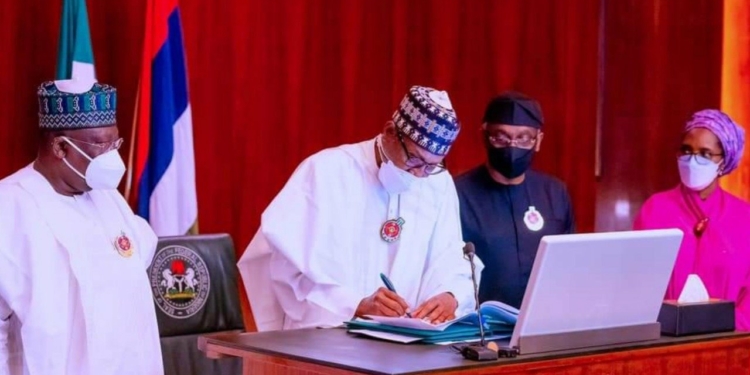President Muhammadu Buhari on Friday in Abuja signed the 2022 Appropriation Bill and the 2021 Finance Bill into law.
The assent, the government says, is in line with restoring a predictable January to December fiscal year provided for in the constitution of the Federal Republic of Nigeria.
Buhari signed the documents in the presence of Senate President Ahmed Lawan, House of Representatives Speaker, Femi Gbajabiamila, and Federal Executive Council (FEC) members.
The Nigerian leader said the budget provides for aggregate expenditures of N17.127trillion, an increase of N735.85billion over the initial Executive Proposal for a total expenditure of N16.391trillion.
He explained that N186.53billion of the increase came from additional critical expenditures authorized by the Minister of Finance, Budget and National Planning to forward to the legislature.
‘‘The Minister will provide the public with the details of the budget as passed by the National Assembly, and signed into law by me,’’ he said.
Buhari said work will start in earnest to ensure early submission of the 2023-2025 Medium-Term Expenditure Framework and Fiscal Strategy Paper and 2023 Appropriation Bill to the National Assembly.
The President directed Heads of Ministries, Departments and Agencies (MDAs) to cooperate with the Ministry of Finance, especially the Budget Office of the Federation.
He, however, expressed strong reservations about the ‘‘worrisome changes’’ made by the National Assembly to the 2022 budget proposal.
Buhari announced he would revert to the lawmakers with a request for an amendment to ensure that ongoing projects cardinal to his administration do not suffer a setback due to reduced funding.
The President complained about the increase in projected FGN Independent Revenue by N400billion, the justification for which is yet to be provided to the Executive.
He lamented the reduction in the provision for Sinking Fund to Retire Maturing Bonds by N22billion without any explanation.
Buhari mentioned the slash of the provisions for the Non-Regular Allowances of the Nigerian Police Force and the Nigerian Navy by N15billion and N5billion respectively.
‘‘This is particularly worrisome because personnel cost provisions are based on agencies’ nominal roll and approved salaries/allowances;
‘‘Furthermore, an increase of N21.72billion in the Overhead budgets of some MDAs, while the sum of N1.96billion was cut from the provision for some MDAs without apparent justification;
‘‘Increase in the provision for Capital spending (excluding Capital share in Statutory Transfer) by a net amount of N575.63 billion, from N4.89trillion to N5.47trillion.’’
President Buhari also expressed concern about the reductions in provisions for some critical projects, including N12.6billion in the Ministry of Transport’s budget for the ongoing Rail Modernisation project.
Others are N25.8billion from the Power Sector Reform Programme under the Ministry of Finance; N14.5 billion from several projects of the Ministry of Agriculture, and introducing over 1,500 new projects into the budgets of this Ministry and its agencies.
‘‘Inclusion of new provisions totalling N36.59 billion for National Assembly’s projects in the Service Wide Vote which negates the principles of separation of Powers and financial autonomy of the Legislative arm of government.
‘‘Provisions made for as many as 10,733 projects were reduced while 6,576 new projects were introduced into the budget by the National Assembly.
‘‘Reduction in the provisions for many strategic capital projects to introduce ‘Empowerment’ projects.
‘‘The cuts in the provisions for several of these projects by the National Assembly may render the projects unimplementable or set back their completion, especially some of this Administration’s strategic capital projects.
‘‘Most of the projects inserted relate to matters that are basically the responsibilities of state and local governments and do not appear to have been properly conceptualised, designed and costed.
‘‘Many more projects have been added to the budgets of some MDAs with no consideration for the institutional capacity to execute the additional projects and/or for the incremental recurrent expenditure that may be required.’’
Buhari declared he was surprised that despite the lawmakers’ increase of projected revenue by N609.27billion, the additional Executive request of N186.53billion for critical expenditure items could not be accommodated without increasing the deficit.
Also, the sum of N550.59billion from the projected incremental revenues was allocated at the discretion of the National Assembly.
‘‘I signed the 2022 Appropriation Bill into law to enable its implementation to commence on 1st January 2022.
‘‘However, I will revert to the National Assembly with a request for amendment and/or virement as soon as the Assembly resumes to ensure that critical ongoing projects that are cardinal to this administration, and those nearing completion, do not suffer a setback due to reduced funding”, Buhari said.








Discussion about this post